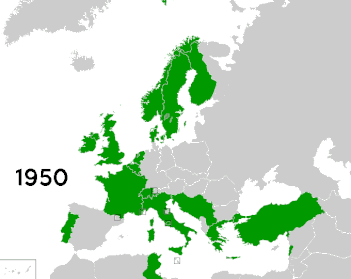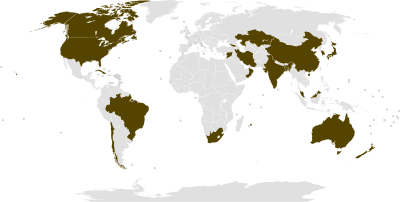European Broadcasting Union
The European Broadcasting Union (EBU; French: Union européenne de radio-télévision, UER; German: Europäische Rundfunkunion, ERU) is an alliance of public service media organisations, established on 12 February 1950. The organisation is made up of 115 member organisations in 56 countries,[2] and 34 associate members from a further 21 countries.[3] It is best known for producing the Eurovision Song Contest. It also hosted debates between candidates for the European Commission presidency for the 2014 and 2019 parliamentary elections but is unrelated to the European Union itself.[4]
 | |
 Countries with one or more members are in dark blue. Associated members in light blue. | |
| Predecessor | International Broadcasting Union |
|---|---|
| Formation | 12 February 1950 |
| Type | Union of broadcasting organisations |
| Headquarters | Geneva, Switzerland |
Membership |
|
Official language | English, French |
President | Lord Hall of Birkenhead[1] |
| Website | Official Website |
General description

.jpg)
EBU members are public service media (PSM) broadcasters whose output is made, financed and controlled by the public, for the public. PSM broadcasters are often established by law but are non-partisan, independent and run for the benefit of society as a whole.
EBU members come from as far north as Iceland and as far south as Egypt, from Ireland in the west and Azerbaijan in the east, and almost every nation from geographical Europe in between. Associate Members are from countries and territories beyond Europe, such as Canada, Japan, Mexico, India and China. Associate members from the United States include ABC, CBS, NBC, CPB, NPR, APM and the only individual station, Chicago-based classical music radio WFMT.
Membership is for media organisations whose countries are within the European Broadcasting Area (EBA), as defined by the International Telecommunication Union, or who are members of the Council of Europe.[5]
Members benefit from:
- Access to world-class content ranging from exclusive sports rights to exchanges for news, music and children's programs.
- A voice in Brussels and on international platforms lobbying for PSM and ensuring the optimal legal and technical framework.
- Opportunities for sharing, learning and collaborating through conferences, working groups, training, and dedicated advice and guidance.
- A centre for learning and sharing new technology and innovation with a team of experts providing strategic advice and guidance.
The EBU's highest-profile production is the Eurovision Song Contest. The EBU also organises the Eurovision Dance Contest, the Junior Eurovision Song Contest, the Eurovision Young Dancers competition, and other competitions which are modeled along similar lines.
Radio collaborations include Euroclassic Notturno – an overnight classical music stream, produced by BBC Radio 3 and broadcast in the United Kingdom as Through the Night – and special theme days, such as the annual Christmas music relays from around Europe.[6] The EBU is a member of the International Music Council.
Most EBU broadcasters have group deals to carry major sporting events including the FIFA World Cup and the inaugural European Championships. Another annually recurring event which is broadcast across Europe through the EBU is the Vienna New Year's Concert.[7]
Eurovision Media Services is the business arm of the EBU and provides first-class media services for many media organisations and sports federations around the world.
The theme music played before EBU broadcasts are Marc-Antoine Charpentier's Prelude to Te Deum. It is well known to Europeans as it is played before and after the Eurovision Song Contest and other important events.[8]
History

The EBU was a successor to the International Broadcasting Union (IBU) that was founded in 1925 and had its administrative headquarters in Geneva and technical office in Brussels. It fostered programming exchanges between members and mediated technical disputes between members that were mostly concerned with frequency and interference issues. It was in effect taken over by Nazi Germany during the Second World War and when the conflict ended in the eyes of the Allies it was a compromised organisation that they could not trust.
In the spring of 1946, representatives of the Soviet radio committee proposed forming a new organisation; however, at the same time preparations were being made for an inter-governmental “European Broadcasting Conference” (EBC) in Copenhagen in 1948 to draw up a new plan for frequency use in the European Broadcasting Area (EBA). It was considered necessary to have an organisation that could implement the “Copenhagen Wavelength Plan” but there was disagreement among broadcasters and particularly a fear expressed by the BBC that a new association might be dominated by the USSR and its proposal to give each of its constituent states one vote. France proposed that it would have four votes with the inclusion of its North African colonies. The United Kingdom felt it would have little influence with just one vote.
On 27 June 1946, the alternative International Broadcasting Organisation (IBO) was founded with 26 members and without British participation. The following day the IBU met in General Assembly and an attempt was made to dissolve it but failed; though 18 of its 28 members left to join the IBO.[9] For a period of time in the late 1940s both the IBU and IBO vied for the role of organising frequencies but Britain decided to be in involved in neither. The BBC attempted but failed to find suitable working arrangements with them. However, for practical purposes, the IBO rented the IBU technical centre in Brussels and employed its staff. The BBC then proposed a new solution based on the IBO changing its constitution so there will be only one member per ITU country, thus ensuring a Western majority over the USSR and its satellite states. In August 1949 a meeting took place in Stresa, Italy but it resulted in disagreement between delegates on how to resolve the problems. One proposal was for the European Broadcasting Area to be replaced by one that would exclude Eastern Europe, the Levant and North Africa.
After Stresa, a consensus emerged among the Western Europeans to form a new organisation and the BBC proposed it be based in London. Meetings in Paris on 31 October and 1 November 1949 sealed the fate of the IBU and IBO, but it was decided not to allow West Germany to be a founder of the new organisation. On 13 February 1950 the European Broadcasting Union had its first meeting with 23 members from the ITU defined European Broadcasting Area at the Imperial Hotel in Torquay, England, United Kingdom. The first president was Ian Jacob of the BBC who remained at the helm for 10 years while its operation was largely dominated by the BBC due to its financial, technical and staff input. The most important difference between the EBU and its predecessors was that EBU membership was for broadcasters and not governments. Early delegates said EBU meetings were cordial and professional and very different from the abrupt tone of its predecessors. West Germany was admitted in 1951 and a working relationship forged with the USSR's Organisation for International Radio and TV (OIRT) which existed in parallel with the EBU until its merger in 1993.[9]
In 1967, the first concert in the International Concert Season of the European Broadcasting Union was broadcast from the Queen Elizabeth Hall in London.[10]
Technical activities
The objective of the EBU's technical activities is simply to assist EBU Members (see below) in this period of unprecedented technological changes. This includes the provision of technical information to Members via conferences and workshops, as well as in written form (such as the EBU Technical Review, and the EBU tech-i magazine).
The EBU also encourages active collaboration between its Members on the basis that they can freely share their knowledge and experience, thus achieving considerably more than individual Members could achieve by themselves. Much of this collaboration is achieved through Project Groups which study specific technical issues of common interest: for example, EBU Members have long been preparing for the revision of the 1961 Stockholm Plan.
The EBU places great emphasis on the use of open standards. Widespread use of open standards (such as MPEG-2, DAB, DVB, etc.) ensures interoperability between products from different vendors, as well as facilitating the exchange of programme material between EBU Members and promoting "horizontal markets" for the benefit of all consumers.
EBU Members and the EBU Technical Department have long played an important role in the development of many systems used in radio and television broadcasting, such as:
- The AES/EBU digital audio interface, formally known as AES3;
- Serial and parallel interfaces for digital video (ITU-R Recommendations 601 and 656);
- RDS – the radio data system used on FM broadcasting.
- The EBU Loudness Recommendation R 128 and 'EBU Mode' meters (EBU Tech 3341)
The EBU has also actively encouraged the development and implementation of:
- Digital audio broadcasting (DAB) through Eureka Project 147 and the WorldDAB Forum.
- Digital Video Broadcasting (DVB) through the DVB Project and DigiTAG.
- Digital radio in the bands currently used for AM broadcasting through DRM (Digital Radio Mondiale).
- Standardisation of PVR systems through the TV-Anytime Forum.
- Development of other content distribution networks on the internet through P2PTV; EBU Project Group D/P2P, from November 2007 to April 2008, with a trial of selected member channels, thanks to Octoshape's distribution platform.[11] The EBU is also part of the European P2P-Next project.
Greek state broadcaster controversy of 2013
On 11 June 2013, the Greek government shut down the state broadcaster ERT, at short notice, citing government spending concerns related to the Euro crisis.[12] In response, the European Broadcasting Union set up a makeshift studio on the same day, near the former ERT offices in Athens, in order to continue providing EBU members with the news-gathering and broadcast relay services which had formerly been provided by ERT.[13]
The EBU put out a statement expressing its "profound dismay" at the shutdown, urged the Greek Prime Minister "to use all his powers to immediately reverse this decision" and offered the "advice, assistance and expertise necessary for ERT to be preserved".[14]
Starting on 4 May 2014, the New Hellenic Radio, Internet and Television broadcaster began nationwide transmissions, taking over ERT's vacant active membership slot in the EBU.[15] On 11 June 2015, two years after ERT's closure, NERIT SA renamed as ERT SA which reopened with a comprehensive program in all radio stations (with nineteen regional, two world-range and five pan-Hellenic range radio stations) and four TV channels ERT1, ERT2, ERT3 and ERT HD (now ERT Sports HD).
Members

The Member list as of August 2019, comprises the following 72 broadcasting companies from 56 countries.[2]
Current members
| Country | Broadcasting organisation | Abbr. | Year |
|---|---|---|---|
| Radio Televizioni Shqiptar | RTSH | 1999 | |
| Public Establishment of Television (Établissement public de télévision) | ENTV | 1970 | |
| National Sound Broadcasting Company (Entreprise nationale de radiodiffusion sonore) | ENRS | ||
| Télédiffusion d'Algérie | DA | ||
| Ràdio i Televisió d'Andorra | RTVA | 2002 | |
| Public Television Company of Armenia (Հայաստանի Հանրային Հեռուստաընկերություն, Hayastani Hanrayin Herrustaynkerut’yun) | ARMTV ՀՀՀ |
2005 | |
| Public Radio of Armenia | ARMR | ||
| Österreichischer Rundfunk | ORF | 1953 | |
| İctimai Television | İCTI/İTV | 2007 | |
| National State Television and Radio Company of Belarus (Нацыянальная дзяржаўная тэлерадыёкампанія Рэспублікі Беларусь, Belteleradio) | BTRC | 1993 | |
| Vlaamse Radio- en Televisieomroeporganisatie | VRT | 1950 | |
| Radio-Télévision Belge de la Communauté Française | RTBF | ||
| Javni Radio Televizijski servis Bosne i Hercegovine | BHRT | 1993 | |
| Bâlgarsko Nacionalno Radio Българско национално радио |
BNR БНР |
1993 | |
| Bâlgarska Nacionalna Televiizija Българска национална телевизия |
BNT БНТ | ||
| Hrvatska Radiotelevizija | HRT | 1993 | |
| Cyprus Broadcasting Corporation (Ραδιοφωνικό Ίδρυμα Κύπρου, Radiofonikó Ídryma Kýprou, Kıbrıs Radyo Yayın Kurumu) | CyBC ΡΊΚ RKYK |
1969 | |
| Český Rozhlas | ČR | 1993 | |
| Česká televize | ČT | ||
| Danmarks Radio | DR | 1950 | |
| TV2 Danmark | DK/TV2 | 1989 | |
| Egyptian Radio and Television Union | ERTU | 1985 | |
| Eesti Rahvusringhääling | ERR | 1993 | |
| Yleisradio | Yle | 1950 | |
| Groupe de Radiodiffusion Française: | GRF | 1950 | |
| TF1 | TF1 | 1950 | |
| Europe 1 | E1 | 1978 | |
| Canal+ | C+ | 1984 | |
| Georgian Public Broadcasting (საქართველოს საზოგადოებრივი მაუწყებელი, sakartvelos sazogadoebrivi mauts'q'ebeli) | GPB სსმ |
2005 | |
Arbeitsgemeinschaft der öffentlich-rechtlichen
Rundfunkanstalten der Bundesrepublik Deutschland (ARD):
|
ARD | 1952 | |
| Zweites Deutsches Fernsehen | ZDF | 1963 | |
| Hellenic Broadcasting Corporation (Ελληνική Ραδιοφωνία Τηλεόραση, Ellinikí Radiofonía Tileórasi) | ERT | 1950–2013, 2015 | |
Hungarian Media Group:
|
HMG | 2014 | |
| Ríkisútvarpið | RÚV | 1956 | |
| صدا و سيمای جمهوری اسلامی ايران | IRIB | 1958 | |
| Raidió Teilifís Éireann | RTÉ | 1950 | |
| TG4 | TG4 | 2007 | |
| Israeli Public Broadcasting Corporation (תאגיד השידור הישראלי, Ta'agid HaShidur HaYisra'eli) | KAN | 2017 | |
| RAI - Radiotelevisione Italiana | RAI | 1950 | |
| Jordan Radio and Television Corporation (مؤسسة الإذاعة والتلفزيون الأردني) | JRTV | 1970 | |
| Latvijas Televīzija | LTV | 1993 | |
| Latvijas Radio | LR | ||
| Télé Liban (تلفزيون لبنان) | TL | 1950 | |
| Libya National Channel | LNC | 2011 | |
| Lietuvos Radijas ir Televizija | LRT | 1993 | |
| RTL Group | RTL | 1950 | |
| Établissement de Radiodiffusion Socioculturelle du Grand-Duché de Luxembourg | ERSL | 1996 | |
| Public Broadcasting Services | PBS | 1970 | |
| Compania Națională "Teleradio-Moldova" | TRM | 1993 | |
Groupement de Radiodiffusion monégasque:
|
GRMC | 1950 | |
| Radio i televizija Crne Gore (Радио и телевизија Црне Горе) | RTCG РТЦГ |
2006 | |
| Broadcasting and Television National Company (الشركة الوطنيَة للإِذاعة والتلفزة) | SNRT | 1950 | |
| Nederlandse Publieke Omroep: | NPO | 1950 | |
| Makedonska radio televizija (Македонска Радио Телевизиjа) | MRT МРТ |
1993 | |
| Norsk Rikskringkasting | NRK | 1950 | |
| TV2 | NO/TV2 | 1993 | |
| Telewizja Polska | TVP | 1993 | |
| Polskie Radio | PR | ||
| Rádio e Televisão de Portugal | RTP | 1950 | |
| Societatea Română de Radiodifuziune | ROR | 1993 | |
| Televiziunea Română | RO/TVR | ||
| Channel One Russia (Первый канал, Perviy kanal) | C1R | 1996 | |
| All-Russia State Television and Radio Broadcasting Company (Vserossiyskaya Gosudarstvennaya Televizionnaya i Radioveshchatelnaya Kompaniya, Всероссийская государственная телевизионная и радиовещательная компания) | VGTRK ВГТРК |
1993 | |
Radio Dom Ostankino:
|
RDO | 1996 | |
| San Marino RTV | SMRTV | 1995 | |
| Radiotelevizija Srbije (Радио-телевизија Србије) | RTS | 2006 | |
| Radio and Television of Slovakia (Rozhlas a televízia Slovenska) | RTVS | 2011 | |
| Radiotelevizija Slovenija | RTVSLO | 1993 | |
| Radiotelevisión Española | RTVE | 1955 | |
Sveriges Television och Radio Grupp:
|
STR | 1950 | |
| Swiss Broadcasting Corporation (SRG SSR): | SRG SSR | 1950 | |
Établissement de la radiodiffusion-télévision tunisienne:
|
RTTT | 1950 | |
| Türkiye Radyo-Televizyon Kurumu | TRT | 1950 | |
| National Public Broadcasting Company of Ukraine (Національна суспільна телерадіокомпанія України, Natsionalna Suspilna Teleradiokompaniya Ukrayiny) | UA:PBC | 1993 | |
| British Broadcasting Corporation | BBC | 1950 | |
United Kingdom Independent Broadcasting:
|
UKIB | 1960 | |
| Vatican Radio | VR | 1950 |
Past members
| Country | Broadcasting organisation | Abbr. | From | To |
|---|---|---|---|---|
| Czechoslovak Television | CST | 1991 | 1992 | |
| MTV3 | FI/MTV | 1993 | 2019[16] | |
| New Hellenic Radio, Internet and Television | NERIT | 2014 | 2015 | |
| Duna TV | Duna | 2013 | ||
| Magyar Rádió | MR | 1993 | ||
| Magyar Televízió | MTV | |||
| Israel Broadcasting Authority | IBA | 1957 | 2017 | |
| Telemontecarlo (now La7) | TMC | 1981 | 2001 | |
| Libyan Jamahiriya Broadcasting Corporation (الجماهيرية اللّيبيّة) | LJBC | 1974 | 2011 | |
| Udruženje javnih radija i televizija (Alliance of Public Radio and Television) | UJRT | 2001 | 2006 | |
| Slovenský rozhlas | SRo | 1993 | 2011 | |
| Slovenská televízia | STV | |||
| Antena 3 Radio | A3R | 1986 | 1993 | |
| Radio Popular SA COPE | COPE | 1998 | 2019[17] | |
| Sociedad Española de Radiodifusión | SER | 1982 | 2020 | |
| TV4 | SE/TV4 | 2004 | 2019[18] | |
| Yugoslav Radio Television | JRT | 1950 | 1992 |
Associate Members

Any group or organisation from an International Telecommunication Union (ITU) member country, which provides a radio or television service outside of the European Broadcasting Area, is permitted to submit applications to the EBU for Associate Membership.[19]
It was also noted by the EBU that any country that is granted Associate Member status does not include any access into the Eurovision events [20] (with the exceptions of Australia, who have participated in the Eurovision Song Contest and the Junior Eurovision Song Contest since 2015, Canada in Eurovision Young Dancers between 1987 and 1989 and Kazakhstan, who have participated in Junior Eurovision since 2018).
The list of Associate Members of EBU comprised the following 34 broadcasting companies from 21 countries as of January 2018.[3]
Past associate members
| Country | Broadcasting organisation | Abbr. | From | To |
|---|---|---|---|---|
| Palestinian Broadcasting Corporation (هيئة الإذاعة والتلفزيون الفلسطينية) | PBC | 2009 | 2014 |
Approved participant members
Any groups or organisations from a country with International Telecommunication Union (ITU) membership, which does not qualify for either the EBU's Active or Associate memberships, but still provide a broadcasting activity for the EBU, are granted a unique Approved Participants membership, which lasts approximately five years. An application for this status may be submitted to the EBU at any given time, providing an annual fee is paid.[21]
The following seven EBU broadcast members had status as Approved Participants in May 2016.[22]
| Broadcasting Organisation | Abbr. |
|---|---|
| Arte | ARTE |
| Catalunya Música | CAT |
| Euronews | EURONEWS |
| JP MRD | JP MRD |
| Cellnex Telecom | CELLNEX |
| Russian Television and Radio Broadcasting Network | RTRN |
| TV5Monde | TV5 |
Organised events
The EBU in co-operation with the respective host broadcaster organises competitions and events in which its members can participate if they wish to do so. These include:
Eurovision Song Contest
The Eurovision Song Contest (French: Concours Eurovision de la Chanson)[23] is an annual international song competition between EBU Members, that was first held in Lugano, Switzerland, on 24 May 1956. Seven countries participated – each submitting two songs, for a total of 14. This was the only contest in which more than one song per country was performed: since 1957 all contests have allowed one entry per country. The 1956 contest was won by the host nation, Switzerland.[24] The most recent host city was Tel Aviv, Israel, where the Netherlands won the competition.
Let the Peoples Sing
Let the Peoples Sing is a biennial choir competition, the participants of which are chosen from radio recordings entered by EBU radio members. The final, encompassing three categories and around ten choirs, is offered as a live broadcast to all EBU members. The overall winner is awarded the Silver Rose Bowl.
Jeux Sans Frontières
Jeux Sans Frontières (English: Games Without Frontiers, or Games Without Borders) was a Europe-wide television game show. In its original conception, it was broadcast from 1965 to 1999 under the auspices of the EBU. The original series run ended in 1982 but was revived in 1988 with a different complexion of nations and was hosted by smaller broadcasters.
Eurovision Young Musicians
Eurovision Young Musicians is a competition for European musicians that are between the ages of 12 and 21 years old. It is organised by the EBU and is a member of EMCY. The first competition was held in Manchester, the United Kingdom on 11 May 1982.
The televised competition is held every two years, with some countries holding national heats. Since its foundation in 1982, the Eurovision Young Musicians competition has become one of the most important music competitions on an international level.
Eurovision Young Dancers
The Eurovision Young Dancers is a biennial dance showcase broadcast on television throughout Europe. The first competition was held in Reggio Emilia, Italy on 16 June 1985.
It uses a format similar to the Eurovision Song Contest, every country that is a member of the EBU has had the opportunity to send a dance act to compete for the title of "Eurovision Young Dancer". The competition is for solo dancers and all contestants must be between the ages of 16 and 21 years and not professionally engaged.
Euroclassic Notturno
Euroclassic Notturno is a six-hour sequence of classical music recordings assembled by BBC Radio from material supplied by members of the EBU and streamed back to those broadcasters by satellite for use in their overnight classical-music schedules. The recordings used are taken not from commercial CDs but from earlier (usually live) radio broadcasts.[25][26]
Junior Eurovision Song Contest
Junior Eurovision Song Contest (French: Concours Eurovision de la Chanson Junior),[27] is an annual international song competition, that was first held in Copenhagen, Denmark, on 15 November 2003. Sixteen countries participated – each submitting one song, for a total of 16 entries. The 2003 Contest was won by Croatia and the current winner is Poland.
Eurovision Dance Contest
The Eurovision Dance Contest (not to be confused with the Eurovision Young Dancers Competition) was an international dancing competition that was held for the first time in London, the United Kingdom on 1 September 2007. The competition was repeated in 2008 when it was held in Glasgow, United Kingdom, but has not been held since.
Eurovision Magic Circus Show
The Eurovision Magic Circus Show was an entertainment show organised by the EBU, which took place in 2010, 2011 and 2012 in Geneva. Children aged between 7-14 representing 8 countries within the EBU membership area, performed a variety of circus acts at the Geneva Christmas Circus (French: Cirque de Noël Genève). The main show was also accompanied by the Magic Circus Show Orchestra.[28]
Eurovision Choir
The inaugural Eurovision Choir featuring non-professional choirs selected by EBU Members, took place on 22 July 2017 in Riga, hosted by the Latvian broadcaster Latvijas Televīzija (LTV). 9 countries took part in the first edition. Carmen Manet from Slovenia was the first winner.
European Sports Championships
The European Sports Championships is a multi-sport event involving some of the leading sports in Europe. The European Governing Bodies for athletics, aquatics, cycling, rowing, golf, gymnastics and triathlon, will coordinate their individual championships as part of the first edition[29] in the summer of 2018, hosted by the cities of Berlin (already chosen as the host for the 2018 European Athletics Championships) and Glasgow (already chosen as the host for the 2018 European Aquatics Championships, and which will now also host the events of the other sports).[30][31]
See also
- Asia-Pacific Broadcasting Union
- Public Broadcasting System (USA)
- Caribbean Broadcasting Union
- Commonwealth Broadcasting Association
- Commonwealth Press Union
- Europe by Satellite
- International Telecommunication Union
- North American Broadcasters Association
- Organización de Telecomunicaciones de Iberoamérica
References
- "EBU - Tony Hall and Delphine Ernotte Cunci elected President and Vice-President of EBU as of 2019". www.ebu.ch. Retrieved 10 December 2018.
- "EBU Active Members". ebu.ch. EBU. Retrieved 9 June 2015.
- "EBU Associate Members". ebu.ch. EBU. Retrieved 9 June 2015.
- "Eurovision Debate". EBU. Retrieved 24 October 2016.
- "42 countries to take part in the 2018 Eurovision Song Contest". European Broadcasting Union. Retrieved 13 May 2014.
- "Joy to the World: a guide to the European Broadcasting Union's Christmas broadcast". CBC Music.
- "Vienna Philharmonic Orchestra New Year's Concert". www.ebu.ch. European Broadcasting Union. Retrieved 28 September 2016.
- Clements, Paul. "Eurovision 2014: how much do you know about the Eurovision Song Contest?". The Telegraph. Retrieved 29 August 2017.
- "50 years of Eurovision (1954-2004)" (PDF). www.ebu.ch. European Broadcasting Union.
- "Euroradio: 50 years" (PDF). Retrieved 31 March 2018.
- "P2P Media Portal Trial". EBU. 10 July 2008. Archived from the original on 11 February 2012. Retrieved 10 July 2008.
- "Greek public broadcaster ERT to be shut down, reopened with fewer employees". ekathimerini.com. 11 June 2013. Retrieved 28 April 2014.
- O'Carroll, Lisa (12 June 2013). "ERT (Greek state broadcaster), Media, Television industry (Media), Radio industry (Media), Greece (News), Europe (News), World news, Digital media, Internet, Social media". The Guardian. London.
- EBU urges the Greek government to reverse decision on ERT. (2013-06-11). Retrieved on 2014-04-28.
- "Greece profile - Media". bbc.com. BBC. Retrieved 13 January 2014.
- Granger, Anthony (13 November 2019). "Finland: MTV3 Leaves European Broadcasting Union". Eurovoix. Retrieved 14 November 2019.
- "Radio Cadena COPE abandona la UER" [Radio Cadena COPE leaves the EBU] (in Spanish). 15 August 2019. Retrieved 15 August 2019.
- Granger, Anthony (13 November 2019). "Sweden: TV4 Ends Membership of the European Broadcasting Union". Eurovoix. Retrieved 14 November 2019.
- "Admission". EBU.ch. Retrieved 27 June 2009.
- "EBU - Members". EBU.ch. Retrieved 7 July 2020.
- "Approved Participants". European Broadcasting Union. Retrieved 10 October 2014.
- "EBU Directory" (PDF). European Broadcasting Union. 2016. Archived from the original (PDF) on 4 March 2016. Retrieved 4 March 2016.
- "Winners of the Eurovision Song Contest" (PDF). European Broadcasting Union. 2003. Archived from the original (PDF) on 7 June 2011. Retrieved 26 December 2007.
- "Historical Milestones". European Broadcasting Union. 2005. Archived from the original on 26 May 2006. Retrieved 26 May 2006.
- "Euroradio Notturno". EBU. Retrieved 18 January 2014.
- "Through the Night". BBC. Retrieved 18 January 2014.
- "Official information page" (in French). European Broadcasting Union. 10 December 2007. Archived from the original on 28 September 2012. Retrieved 6 July 2008.
- Burkhardt, Nadja (16 November 2012). "Eurovision Magic Circus Show". ebu.ch. European Broadcasting Union. Retrieved 6 September 2016.
- europeansportschampionships.com ESC Press Release
- "European Athletics - Leading sports bring together their European championships in 2018". Retrieved 24 October 2016.
- "Rowing joins the innovative European Sports Championships - worldrowing.com". Retrieved 24 October 2016.
.jpg)
.jpg)